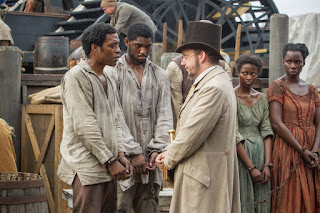Continued from last post . . . The centuries long genocide of hundreds of indigenous American cultures is one of the most horrifying legacies of the modern United States of America. Beyond all the visceral violence itself, its true terror lies in how essential this genocide was to the American project’s utopia.
 |
| Slavery was the fundamental injustice that corrupted the promise of America. |
Recognizing the indigenous cultures of North America as genuine human societies worthy of respect would have put boundaries and blocks on America's expansion. This expansion was necessary for the radical democratic project of America's people building their new country from nothing.
So they had to treat their indigenous neighbours as nothing, if the American project was to get off the ground.
Compounding the horror of this genocide is that there was another genocide built into the founding institutions of America that even short-circuited its radical democracy. So the indigenous were destroyed for the sake of a project that was corrupted before it could begin.
That corruption was slavery.
The indigenous of North America have always been excluded from America. The African slaves that built the initial prosperity of the colonies on the plantations are a different matter. From the start of American settlement, slaves were included in the American system.
African slave labour was entirely above board, official in every way. Not only did the founders of America as an independent country own slaves, but slavery had long been an ordinary part of America’s economy by the revolutionary war of the 1770s and 80s.
It would be decades after independence that the paradox of being democratic slave holders caused enough ethical dissonance in many and enough soul-churning self-hatred in the radical few that a social movement for liberation began.
 |
| Samuel L Jackson's Marquis Warren is the only black hero from the American Civil War in our pop culture at the moment. It's okay that he's fictional, but there are plenty of real black war heroes who's lives would make fantastic films. |
It would be a generation after modern humanity’s first revolution in the name of freedom that the abolitionist social movement kicked into high gear. It was as if a generation of children needed to be raised in an environment that praised freedom that enough of them would understand wretchedness of being a slave-holding democrat.
The paradox is especially abhorrent to an American who genuinely understands the nature of America's productive democracy. Remember how Antonio Negri analyzed the project in the American constitution and The Federalist Papers.
You took part in America by building America. The freedom of America was in using your labour to build the country. Yet here was this enormous population – the slaves – who invested horrifying, back-breaking, mind-crushing toil in building America.
And they remained in chains. They had nothing. It was repellent.
The ridiculous three-fifths compromise of the constitution in slave-holding days testified to the ad hoc, unsustainable nature of the slave economy in a country whose politics and production was defined by a compact of freedom in and through work and construction.
America’s institutions were going to work themselves into schizophrenic seizures until this problem was fully and completely sorted out. African slaves were a population who were included in the country, and whose work produced the institutions and wealth of America.
 |
| The movement to complete America's promise of liberation continues. |
But as slaves, they had none of the power. A slave was a paradoxical creature, and a destructive paradox at that. The status of a slave in a country whose freedom was grounded on productivity is a fundamental injustice.
A country and a society and a civilization can’t stand on such a fundamental paradox without eventually tearing itself apart. It did.
And since the Civil War, America has proceeded to tear itself apart time after time, if to a lesser intensity. Slavery may be gone as an institution, but the profound anti-black racism that fuelled and justified slavery’s institutions remain in American society.
There are many in America for whom the black population still has the status of a slave, economically and philosophically, if not institutionally and politically. Black Americans are allowed to work and contribute to building and maintaining America, according to the racist, but they have no claim on America's freedom.
Yet the only justification needed for such a claim is that you work and contribute to building and maintaining America. An ‘unless’ clause makes no sense, and worse, makes a mockery of the compact of productivity and freedom from the start.
Until America overcomes even its most pervasive systemic racism, it will always fall short of its promise of freedom open to anyone.
And America was, in its inception, one of the best chances humanity's had to establish a real society of freedom. It makes me wonder what will be required for real human liberation . . . To be continued.
No comments:
Post a Comment